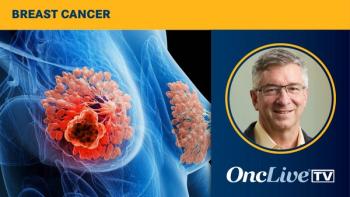
Reviewing Best Practices in the Surgical Management of Breast Cancer: How Disease Stage Informs Treatment

In this first episode of OncChats: Reviewing Best Practices in the Surgical Management of Breast Cancer, Gladys Giron, MD, FACS, and Cristina Lopez-Peñalver, MD, explain how treatment approaches differ based on disease stage in patients with breast cancer.
Episodes in this series

In this first episode of OncChats: Reviewing Best Practices in the Surgical Management of Breast Cancer, Gladys Giron, MD, FACS, and Cristina Lopez-Peñalver, MD, both of Baptist Health South Florida, explain how treatment approaches differ based on disease stage in patients with breast cancer.
Giron: Thank you for joining us. My name is Dr Gladys Giron, and I’m delighted to collaborate with my colleague, Dr Cristina Lopez-Peñalver, as we discuss current recommendations for the surgical treatment of [patients with] stage III and IV breast cancer. As I mentioned, my name is Dr Gladys Giron; I’m a breast surgical oncologist at the Miami Cancer Institute, part of Baptist Health South Florida. I’m joined today by Dr Cristina Lopez-Peñalver, my fellow breast surgical oncologist at the Miami Cancer Institute. We have a variety of topics to dive into, so without further ado, I’ll begin with the first question.
Dr Lopez-Peñalver, [could you] please provide us with a brief summary of what differentiates [patients with] stage III and IV breast cancer from those presenting with earlier stages of disease?
Lopez-Peñalver:Thank you, Gladys. Stage III and IV breast cancers differ from other stages of breast cancer based on the extent of the disease or their anatomic classification, the so-called TNM categories, and also differ in how they are treated.
In terms of anatomic extent, when we talk about breast cancer, we like to divide it into nonmetastatic breast cancer and metastatic breast cancer. The nonmetastatic category can be further divided into early-stage disease and locally advanced disease. When we talk about early-stage disease, that includes stages I, IIA, and a subset of stage IIB disease, whereas when we talk about locally advanced breast cancer, that includes some stage IIB disease and stage III disease. Stage III disease really encompasses tumors that are 5 centimeters or less in size with matted lymph nodes, tumors that are over 5 centimeters in size with positive lymph nodes, any primary tumor that’s attached to the skin or to the chest wall, or a special type of breast cancer called inflammatory cancers. Then finally, [those with] the stage IV disease, or the metastatic cases, are those advanced cases where the breast cancer has spread beyond the breast to other organs such as the lung, the liver, and the bones.
In terms of management, these stages also differ. In general, patients with early-stage breast cancer undergo up-front surgery, or surgery first, with the surgical approach to the breast really being dictated by the size of the tumor and whether there is multifocal disease present. The surgery of the axilla, either a sentinel node biopsy or an axillary node dissection, [is] performed depending on whether there is clinical evidence of lymph node involvement. Breast-conserving surgery is usually followed by radiation and then all patients receive adjuvant systemic therapy based on their tumor characteristics and their receptor status.
In contrast, patients with locally advanced breast cancers usually require neoadjuvant systemic therapy prior to surgery to induce some kind of tumor response and downstage either the breast, the lymph nodes, or both, allowing for breast-conserving surgery and possibly sparing an axillary node dissection. Then, these patients go on to receive the appropriate adjuvant systemic therapy based on their receptor status and whether there is any residual disease after neoadjuvant therapy.
Check back on Tuesday for the next episode in this series.









































